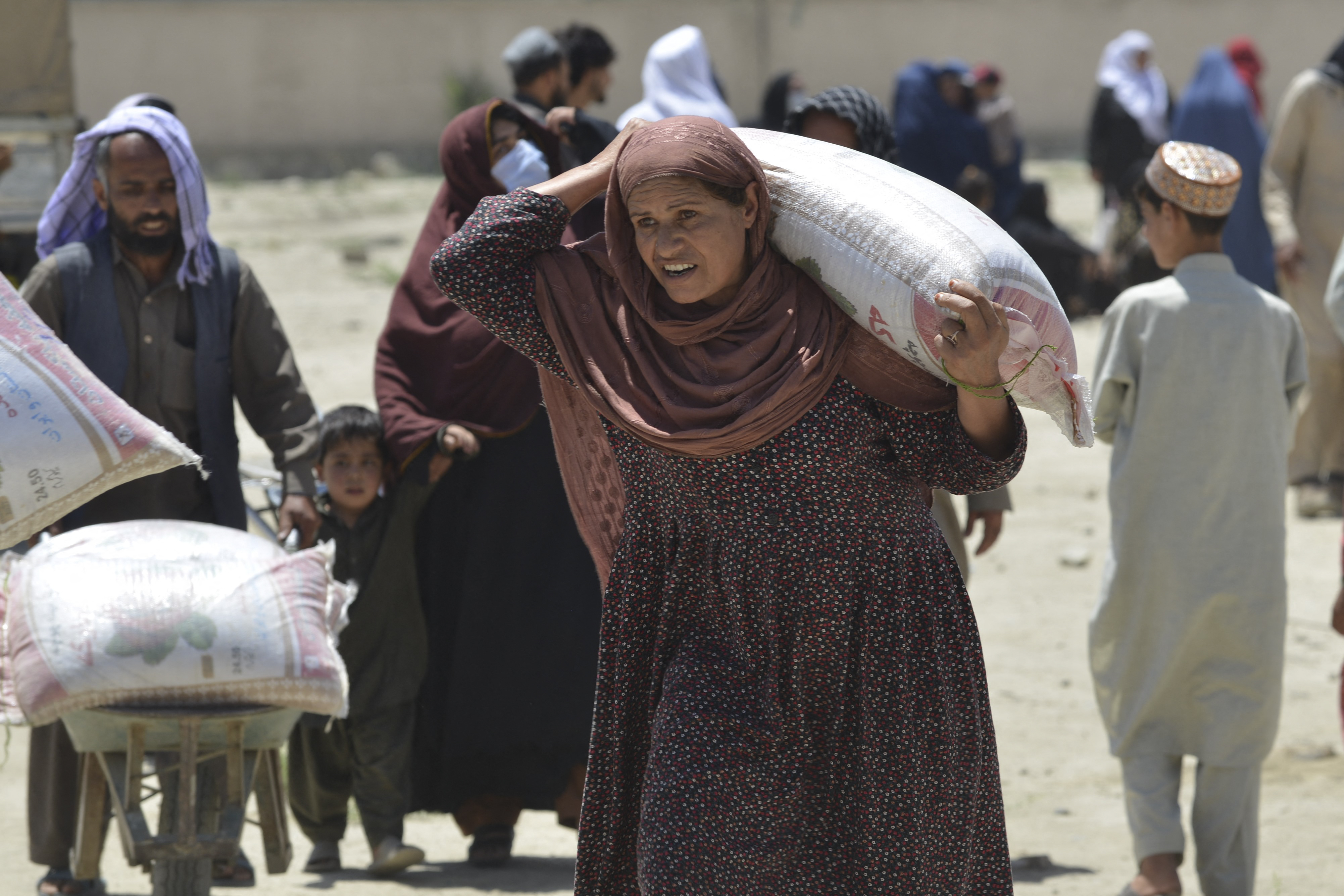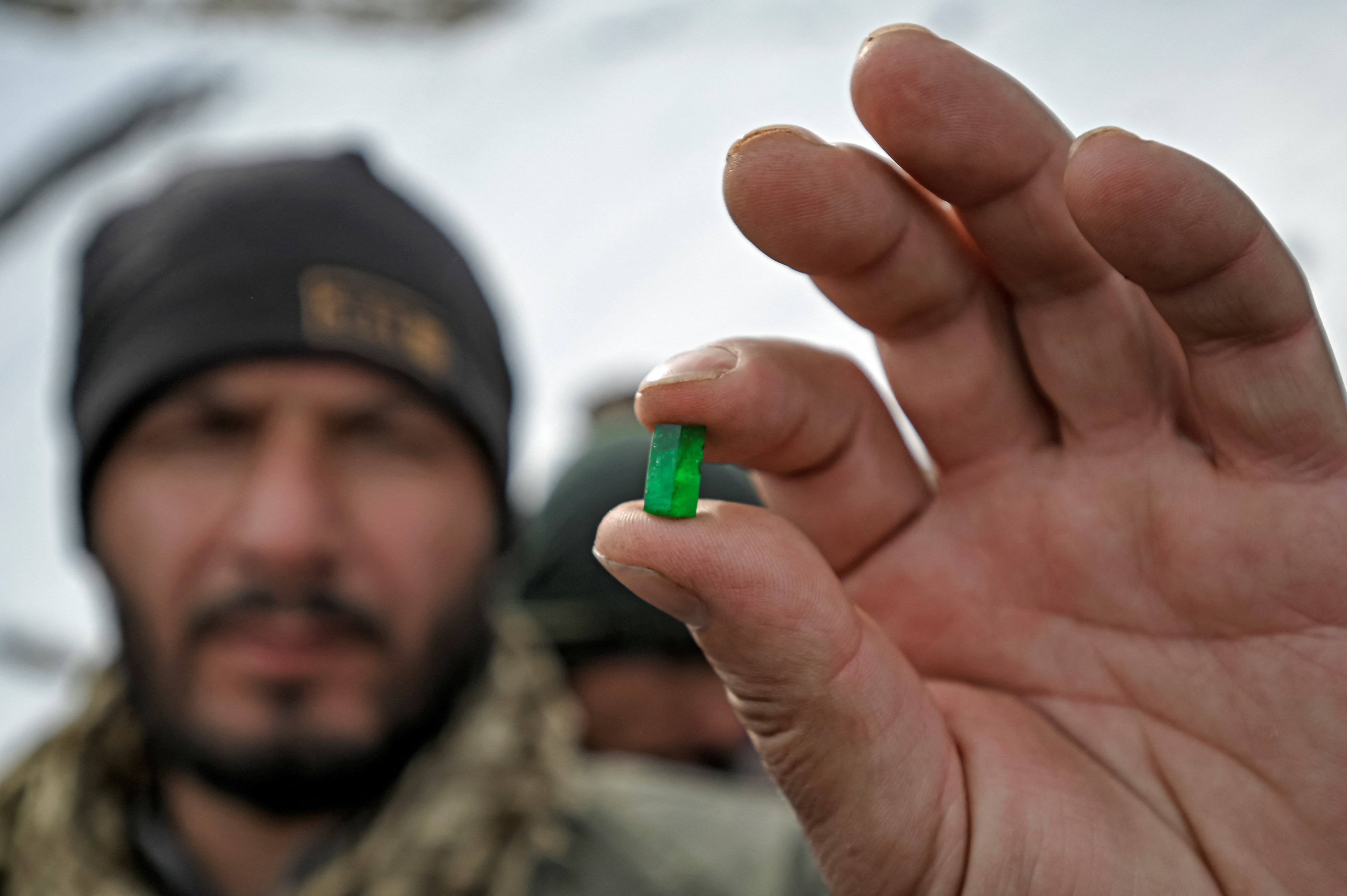Before the U.S. withdrew from Afghanistan last August, Chinese businessman Sun Fei made a comfortable living in the country importing and selling electrical appliances and goods from neighboring China and Pakistan—teapots, space heaters, solar panels.
But just weeks after the Taliban returned to power, his sales slowed to a trickle. Many of his wealthy clients fled the country in fear of the Islamic fundamentalist group’s rule, he said, and restrictions on overseas transfers made it impossible to send money home or pay manufacturers.
Videos by VICE
But the 36-year-old, one of a handful of Chinese businessmen based in Kandahar, Afghanistan’s second-largest city and the birthplace of the insurgent group, soon found a new trade: acting as an intermediary between local Taliban officials and Chinese investors eyeing Afghanistan’s mineral resources. “I’ve become quite close to the Taliban, because they are everywhere. It is impossible to not know them,” Sun told VICE World News.
A native of the northern Chinese province of Heilongjiang, Sun has settled in Kandahar for nearly three years and carved out a successful career for himself. He shares snippets of his life in Afghanistan on Douyin, the Chinese version of TikTok. Sporting a turban and black-rimmed glasses, he picked mulberries from trees and ate lamb with his hands. He also took his 186,000 followers on virtual tours to local mines and drank tea with officials in government offices.
Buoyed by the warming ties between China and the Taliban government, a growing number of Chinese entrepreneurs are following in his footsteps in hopes of trying their luck in Afghanistan.
Some 200 Chinese businessmen have arrived in the country since the Taliban took over last August, according to an estimate by China Town Kabul, a business group that has operated in Afghanistan for nearly two decades.

But life is not as rosy as the picture Sun paints on social media. He has been holed up at home, fearing for his life amid a recent spate of deadly attacks, some of which were claimed by the local branch of the Islamic State group. He compared his own fortune with that of his peers, who have businesses in the U.S. and the Netherlands. “They are safe every day and spend their money happily. I dare not even go out,” Sun said.
Afghanistan’s volatile security situation highlights the challenges for China, which has emerged as the only major power in Afghanistan after the U.S. and its allies pulled their troops out last year, ending a 20-year occupation.
Though Beijing stopped short of formally recognizing the Taliban government, it offered crucial support for the new regime and has repeatedly pledged to help rebuild the war-torn country. But a year on, except for the economic opportunities brought on by some small-time entrepreneurs and more established firms, few of China’s promises have materialized as Beijing continues to look on with caution, experts say.
How China engages the Taliban regime is not that different from its interactions with the previous government, only it is “more loud” and it stood out as few other countries are providing the same assistance, Raffaello Pantucci, a senior fellow at the S. Rajaratnam School of International Studies in Singapore, told VICE World News. “The one thing that seems to have materially changed is the volume of Chinese entrepreneurs who are heading to Afghanistan to have a go.”
Diplomatic recognition will come “when conditions are ripe,” Chinese Foreign Minister Wang Yi said in March, when China hosted a meeting among the foreign ministers of Kabul’s neighbors. He has called on the international community to lift the sanctions, which froze billions of dollars in Afghan reserves and crippled its economy, and assured it would “uphold justice” for its South Asian neighbor in the United Nations. Last month, Wang also offered to extend the China-Pakistan Economic Corridor, a $62 billion infrastructure project, to the country.
The relationship goes both ways. As China steps up its role in the region, the Taliban government also increasingly looks to Beijing for help. It approached the Chinese embassy for assistance when a forest fire ravaged its eastern Nuristan province in June. When a devastating earthquake killed more than 1,000 Afghans a few weeks later, China sent a $8-million aid package and its ambassador Wang Yu announced long-term economic reconstruction plans in a joint conference with the Taliban administration.

Taliban officials celebrated in November, when exports of pine nuts to China resumed, offering a thin lifeline to its struggling economy. Top Chinese livestreamer Li Jiaqi sold 120,000 cans of the Afghan cash crop in two hours alone, giving ordinary Afghan farmers a glimpse of what they could gain from access to China’s 1.4 billion consumers.
But despite the publicity over China’s engagement with the Taliban government, its policy toward Afghanistan has not changed since the new regime took over, experts say.
For instance, the touted financial assistance: “There is a kind of propaganda to suggest that there’s a lot more going on with it than there is, but just placing it in relative terms, it’s extremely modest,” Andrew Small, a senior fellow at the German Marshall Fund, told VICE World News. The U.S. pledged nearly $55 million in immediate aid for Afghanistan after the earthquake, bringing the total amount of humanitarian assistance to more than $774 million, while China donated $37.4 million.
On the other hand, the Chinese state-owned enterprises, the big players that would really be able to transform the country and provide infrastructure, are proceeding along on the same projects that they had been discussing with the previous Afghan republic and encountering the same obstacles, said Pantucci of S. Rajaratnam School of International Studies.
One such project is Mes Aynak. Home to the world’s second-largest copper deposit, the site could bring in up to $300 million in state revenue per year for the Taliban government.

A Chinese state-owned company signed a $3-billion agreement with the Hamid Karzai administration in 2007 for the rights to mine for 30 years, but the project has been stalled for more than a decade due to sporadic attacks and the valuable antiquities at the 2,000-year-old Buddhist city.
A Chinese delegation traveled to Kabul for negotiations in March and visited the mine in June. However, the site stays at a standstill and doubts remain about its opening. A Taliban official said that the Chinese company has sought to pull out of terms of its agreement, including moving the antiquities for preservation, building a power plant to supply electricity to the site and Kabul, and reimbursing the locals whose lands would be taken.
Similarly, other state-backed projects on oil and gas, which ground to a halt amid the chaos last year, have yet to resume. “Some of the Chinese private companies are running, but only small businesses and not regular operations,” said Gao Susu, a representative of China Town Kabul. It is also not possible for private companies to expand on a large scale, given the sanctions and restrictions on currency conversion, which are among the many complications companies have to navigate on the ground, she added.
Jiacong You, who runs a company selling jewelry, moved from Africa to Afghanistan in December to buy rough gemstones directly from mines, which he visits in the company of private security contractors.
“Opportunities abound as with any developing country,” You told VICE World News. “But a deciding factor is whether the government is stable, because till now, no country is willing to recognize their rule.”

China Town Kabul is an exception. A 2-million-square-feet sprawling industrial park was approved by the Taliban government in April and the project is now in the works, three years after it was first proposed by the private group. “Sure, the risk is obvious and widely-known. But if you overly emphasize the risk, your only conclusion would be to leave,” Gao said.
So why the hesitancy on China’s part? Despite Chinese companies’ interests in Afghanistan’s vast wealth of minerals, experts say Beijing’s chief concern with Afghanistan isn’t economic gain.
“I think the first priority for China is just that it doesn’t turn into a kind of security threat or a terrorist hub,” Small, of the German Marshall Fund, said. “They don’t want a mess that spills over into the neighborhood. They want to keep risks contained. I don’t necessarily think they have a maximalist kind of agenda in Afghanistan.”
Right from the beginning of its engagement with Taliban officials, China has placed security in the front and center of its agenda. The Chinese government has repeatedly pressed the new regime to tackle terrorism, particularly, the East Turkestan Islamic Movement (ETIM), an Uyghur militant group that seeks to liberate the Xinjiang region and which Beijing sees as a threat. A video that recently surfaced, however, shows the group’s leader Abdul Haq al Turkistani celebrating Eid in northern Afghanistan in May. “It’s a bit of a smack in the face,” Pantucci said.
Such incidents put a strain on the budding relationship between China and Afghanistan. In a meeting late last month, Amir Khan Muttaqi, acting foreign minister of the Afghan interim government, reassured Chinese Foreign Minister Wang Yi the Taliban would never allow its territory to be used for “anti-China activities.”
But a report released by the United Nations Security Council suggested that even though ETIM has been restrained by the Taliban so far, it is active in the northern provinces of the country and plans to carry out terrorist attacks against Chinese interests in the region “when the time is right.”

Like many countries, China had been observing the situation to see what kind of government would emerge in Afghanistan, particularly given the inter-factional feuds within the insurgent group, and whether it could clear enough hurdles to establish international legitimacy. And as its reversal on girls’ education showed, the Afghan government is led by hard-line factions, which are driven by ideology rather than pragmatism, and which Beijing finds more uncomfortable to deal with.
China is also aware of how quickly the situation could shift, which hardly gives it the confidence to proceed with bigger investment in the near future. “The unpredictability is going to be absolutely endemic for anyone—official or private sector—who’s operating in Afghanistan,” Small said.
On the other hand, the Taliban’s patience may also run out as China stalls on the delivery of its promises. “At what point does the government in Afghanistan just get irritated that the Chinese keep saying they’re going to do all this wonderful stuff and nothing comes?” Pantucci said.
But even if the Chinese government does not yet see a long term future in Afghanistan, some try not to let the uncertainty mar their optimism. Back in Kandahar, Sun showed his followers the solar panels that lined his roof, ensuring reliable electricity despite frequent blackouts in the country.
“It’s hard to summarize my experience here,” Sun said. “But I am hoping to stay for the rest of my life.”
More
From VICE
-

Screenshot: Ubisoft -

Isabel Pavia/Getty Images





